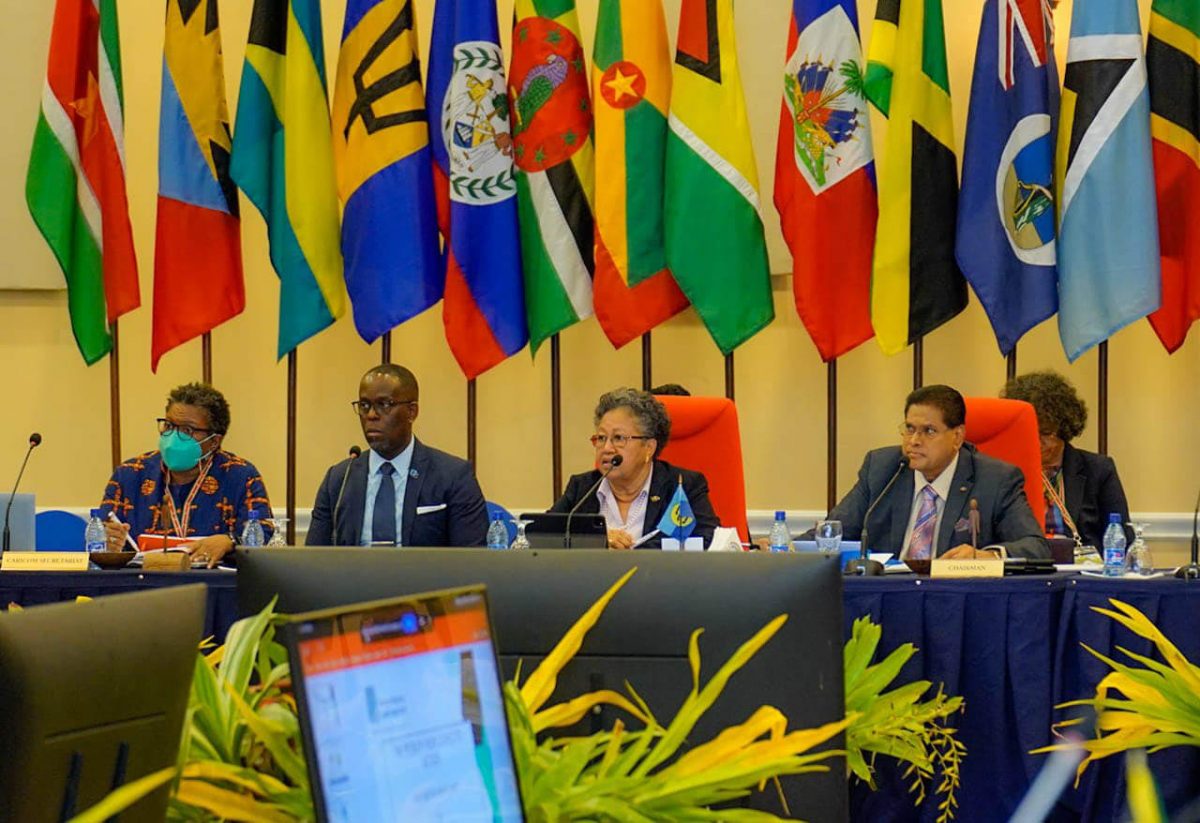Declaring disappointment at the slow pace of the regional single market and economy, CARICOM Heads have taken immediate steps which include agreement on the definition and qualifications for household domestics.
This is according to the communique released yesterday following their summit this week in Suriname.
“Heads of Government expressed disappointment at the slow pace of implementation of the CARICOM Single Market and Economy (CSME) and took immediate steps to move the process forward.
“They noted in particular the area of movement of skilled workers and in that regard agreed to definitions of and qualifications for household domestics, an agricultural worker and private security officer which are agreed categories for free movement”, the communique said.
It also said that Heads mandated the Georgetown-based CARICOM Secretariat to convene meetings of the Registrars of Companies and the Ministers with responsibility for companies before the end of July 2022 to set out the steps to enable Member States to implement the principle of mutual recognition of any company incorporated in another CARICOM Member State and to report to the Conference at its meeting in September.
Additionally, it was acknowledged that online solutions designed to increase efficiency in the delivery of services to the Region have been advanced. The communique said that these include – the Labour Market Information System (LMIS), Online Companies Registry System (OCRS), the Community Public Procurement Notice Board (CPPNB), the CARICOM Rapid Alert System for Exchange of Information on Dangerous (non-food) Goods (CARREX) and the CARICOM Interactive Marketplace and Suspension Procedure (CIMSuPro).
Meanwhile, on the agriculture front, the communique said that the majority of CARICOM member states have developed and submitted to their Ministerial Task Force on Food Production and Food Security (MTF) their national targets which are expected to help achieve the lowering of food imports by 25% by 2025.
CARICOM is hoping to reduce its US$5 billion food import bill by 25% in the next five years by implementing food and nutrition programmes.
According to the communique, the MTF, through the Secretariat, has developed a reporting and monitoring tool which Member States are requested to report on monthly. The CARICOM Council for Trade and Economic Development (COTED) has been mandated to conclude, by the end of July 2022, various initiatives and programmes, aimed at the removal of Non-Tariff Barriers to Intra-Regional Trade.
Additionally, Heads of Government requested the CARICOM Private Sector Organization Inc (CPSO) to accelerate implementation of its various agricultural investment projects.
Already, 19 potential investment opportunities for displacing extra-regional agri-food imports have been identified by the MTF among CARICOM Member States.
President Irfaan Ali, who is the Lead Head of Government with responsibility for Agriculture and Agriculture Development in the CARICOM Quasi-Cabinet, has been commended for the success of the CARICOM Agri-Investment Forum and Expo held in Guyana from 19-21 May 2022 and endorsed the Action Plan and Outcome Statement of the event, which called for priority action to be centred around Food Insecurity, Regional Transportation, Trade Barriers, and Women and Youth in Agriculture.
The Draft Terms of Reference (TOR) developed by the Secretariat for the establishment of a Regional Youth in Agriculture Advisory Mechanism, which will assist the MTF in ensuring that youth participation and inclusion is accounted for in all its efforts to achieving 25 by 2025, was also presented.
On the issue of transportation, the Prime Minister of Barbados, Mia Mottley gave an update on advanced discussions with the United Arab Emirates regarding support for both a traditional ferry and fast ferry service for the transportation of agricultural produce. A related proposal is being awaited.
The Caribbean Development Bank (CDB) has been requested to begin the proposed roadmap study on the factors needed for successfully establishing a fast ferry service for the transportation of agricultural produce.
Initial focus will be on trade between Guyana, Trinidad and Tobago, Grenada, and Barbados. A working group will be established to provide oversight of the project, which will include representatives from the governments of Barbados, Grenada, Guyana and Trinidad and Tobago, as well as the CARICOM Secretariat, CPSO and the CDB.
Meanwhile, Suriname has been added as the Lead Head Industrial Policy to the core membership of the Prime Ministerial Sub-Committee on the CSME to address the urgent need to develop an Industrial Policy Strategy for CARICOM.
A technical working group that will focus on the implementation of the Policy will be established. However, recommendations would be considered and approved by a Ministerial Task Force on Industrial Policy chaired by Suriname.






